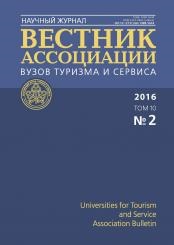The article is devoted to the issue of identifying the prerequisites and conditions for the formation of the system of clusters of the youth tourism in the North-Western Federal district. Despite the active development of cluster structures in tourism and hospitality, both in Russian and abroad they pay fairly little attention to the establishment of clusters in the sphere of youth tourism. The reasons for this phenomenon is due to the peculiarities of youth tourism (not always profitable nature of this sphere of private businesses, the increased level of attention to consumers and their safety, etc.), as well as the need to strictly control and regulate the various ministries and agencies, whose functional duties are somehow connected with the safeguarding and protecting children and young people. The creation of the system of effectively functioning regional and municipal clusters, the youth tourism would solve many of the problems facing the industry as a whole. The goal of creating a modern and efficient cluster formations in the study area, according to the authors, should have a close connaction with youth tourism peculiarities as a sector of tourism and should take into account the specific trends and dynamics of development of this phenomenon in the Russian context. An important aspect in the modeling process of tourism cluster in the field of youth tourism should recognize the correct definition and allocation of characteristics and features based on classification features, which are typical to any cluster in the field of tourism and hospitality in the Russian Federation.
youth tourism, tourism product, motivation of the consumer of tourism services, special types of tourism, state regulation of tourism activities
1. Vetitnev A.M., Orgina E.V. Upravlenie rynkom detskogo ozdorovitel’nogo turizma [Market management of child health tourism]. M.: Infra-M, 2012. 136 p.
2. Karpova G.A., Valeeva E.O. Razvitie turizma kak konkurentnoe preimushchestvo territorii (na primere sub”ektov SZFO) [Tourism development as the competitive advantage of the territory (on the example of the Northwest federal district subjects)] // Izvestiya Sankt-Peterburgskogo gosudarstvennogo ekonomicheskogo universiteta [Bulletin of Saint- Petersburg state university of economics]. 2015. № 1 (91). P. 44-51
3. Kruzhalin V.I. Tendentsii razvitiya fundamental’nykh i prikladnykh issledovanii v turizme i rekreatsii [Development trends of fundamental and applied research in tourism and recreation] // Vestnik RMAT [Vestnik RIAT]. 2011. № 3. P. 23-30
4. Levchenko T.P., Kulyan K.K., Kulyan M.K. Klasternyi podkhod k ustoichivomu razvitiyu turistskikh destinatsii [Cluster approach to sustainable development of tourist destinations] // Vestnik SGUTiKD. 2012. № 2 (20). P. 67-72.
5. Petrova O.N., Klevchenkov M.G. Klaster kak instrument obespecheniya konkurentosposobnosti turistskogo kompleksa regiona [Cluster as a tool for competitiveness of tourism sector in the region] // Regional’naya ekonomika: teoriya i praktika [Regional economy: theory and practice]. 2010. № 13. P. 42-47.
6. Rudneva P.S. Opyt sozdaniya strukturnykh klasterov v razvitykh stranakh [Experience of creating structural clusters in developed countries] // Ekonomika regiona [Economics of the region]. 2007. № 18. P. 10-16.
7. Fedorets E.N. Otsenka effektivnosti deyatel’nosti turisticheskogo klastera [The point of effective development of tourist cluster] // Vektor nauki TGU. Seriya «Ekonomika i upravlenie» [Vector of science of Togliatti state University. Series: economy and management]. 2011. № 1 (4). P. 24-28.
8. Cooke, R. Martin (red.), Clusters and Regional Development. Critical Reflections and Explorations, London: Routledge. 2012. p. 425
9. Solvell O., The Cluster Initiative Greenbook CIND, Uppsala University, ISC, Harvard Business School, TSI Global Conference, Gothenburg- 2012
10. Van der Linde C., Class: The Demography of Clusters - Finding from the Cluster Meta - Study, New York, 2013.





